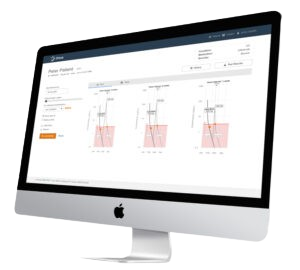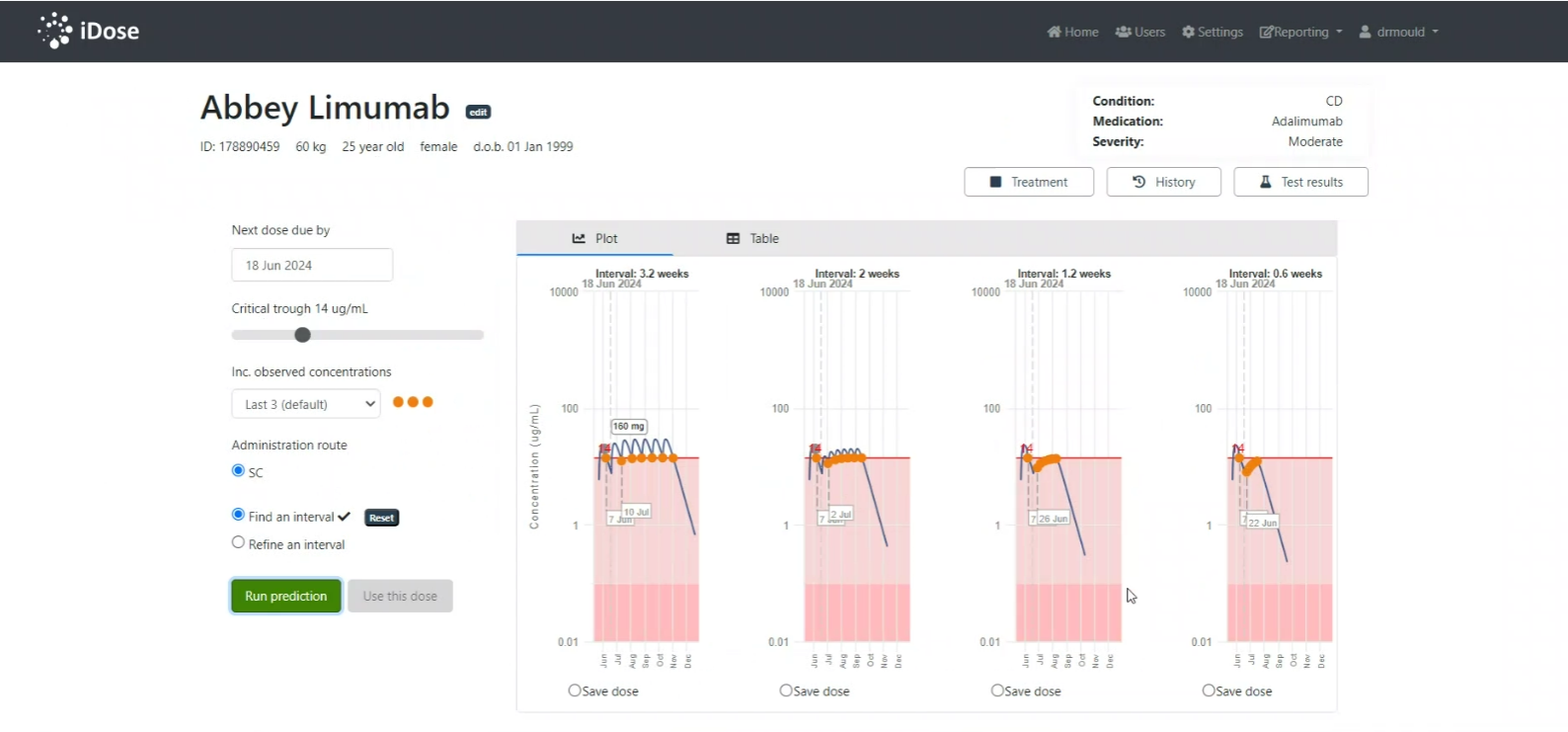Inflammatory Bowel Disease (IBD) management, particularly with biologic therapies like Infliximab (IFX), presents numerous challenges for gastroenterologists. Despite the widespread use of IFX, a significant proportion of patients experience a loss of response over time – often within the first year of treatment – due to the development of Anti-Drug Antibodies (ADA) and unpredictable variations in drug clearance. These complications not only disrupt the continuity of care but also necessitate alternative treatments, often with less favorable outcomes or increased risks.
Baysient’s iDose offers a solution by providing an advanced Therapeutic Drug Monitoring (TDM) system designed to preemptively combat these issues. iDose equips healthcare providers with the tools to personalize IFX dosing, reduce immunogenicity, and significantly enhance the durability of the treatment.
The Underlying Problem: Loss of Response to Infliximab
For many patients with IBD, IFX offers substantial relief from the debilitating symptoms of their disease, improving both quality of life and long-term outcomes. However, the reality is that up to 40% of patients discontinue IFX within the first year of treatment due to either primary non-response or loss of response. This can be attributed to:
- Formation of Anti-Drug Antibodies (ADA): ADAs neutralize the therapeutic effect of IFX, reducing its efficacy and leading to treatment failure.
- Suboptimal Trough Levels: Variability in individual drug clearance can result in IFX concentrations that are too low to maintain therapeutic efficacy, even in the absence of ADA.
- Idiopathic Causes: For example, the inflammatory mechanism may not be strongly related to TNF (the target for IFX as an anti-TNF therapy).
These challenges necessitate a proactive approach to dosing, where adjustments are made based on real-time data rather than standardized dosing regimens that may not reflect individual patient needs.
The Role of Therapeutic Drug Monitoring (TDM)
TDM is an essential tool in managing biologic therapies like IFX. By regularly measuring drug levels and the presence of ADA, clinicians can make informed decisions about adjusting dosages to maintain therapeutic levels and prevent immunogenicity. However, traditional TDM methods are often reactive, adjusting doses only after a patient has already begun to lose response.
iDose: Precision Dosing to Prevent Loss of Response
Baysient’s iDose is an advanced, dashboard-driven TDM solution designed to take a more proactive approach to IFX therapy. By integrating Bayesian models with patient-specific data, iDose provides clinicians with precise dosing recommendations that can prevent therapeutic failure before it occurs.
How iDose Works
iDose uses a sophisticated algorithm that incorporates a wide range of patient-specific variables:
- Patient Weight
- Serum Albumin Levels
- C-Reactive Protein (CRP) Levels
- Presence of Anti-Drug Antibodies (ADA)
- Previous IFX Trough Levels
By analyzing these factors, iDose generates individualized dosing schedules aimed at maintaining optimal IFX concentrations throughout the treatment cycle. This precision dosing helps to prevent the conditions that lead to ADA development and loss of response.
Scientific Evidence: The Impact of iDose on Infliximab Therapy
The effectiveness of iDose has been validated through rigorous clinical research. A 2022 study involving 180 pediatric and adult IBD patients evaluated the impact of iDose on IFX durability and immunogenicity. The study’s findings highlight the critical role of iDose in optimizing IFX therapy:
Accelerated Dosing (AD) Predictions
The study demonstrated that iDose accurately predicted the need for accelerated dosing in 41% of patients at the third infusion (INF3) and 69% of patients at the fourth infusion (INF4). Early intervention is crucial in maintaining adequate drug levels and preventing ADA formation.
Reduction in ADA Development
Adherence to iDose’s dosing recommendations resulted in significantly lower rates of ADA development. Nonadherence at INF4 was strongly associated with an increased risk of ADA formation (p < .0001), directly correlating with treatment failure.
Sustained Remission Rates
By week 52, 97% of patients who followed iDose-driven dosing were in steroid-free remission, illustrating the system’s ability to maintain long-term disease control without the need for additional immunosuppressive therapies.
These findings underscore the importance of iDose in managing IFX therapy, offering a means to provide more consistent, reliable care and improving long-term patient outcomes.
Why Should Gastroenterologists Adopt iDose?
The adoption of iDose in clinical practice offers several key benefits that are directly relevant to gastroenterologists managing IBD patients:
1. Improved Patient Outcomes
The most compelling reason to adopt iDose is its proven ability to improve patient outcomes. By reducing the risk of ADA development and ensuring consistent therapeutic trough levels, iDose helps maintain the efficacy of IFX over time. This translates into higher rates of remission, fewer flare-ups, and a better quality of life for patients.
2. Data-Driven Decision Making
iDose empowers clinicians with the tools they need to make informed, data-driven decisions about IFX dosing. The system’s use of Bayesian models to integrate patient-specific data ensures that dosing recommendations are tailored to the individual needs of each patient, rather than relying on a one-size-fits-all approach.
3. Cost-Effectiveness
A recent publication showed that proactive therapeutic drug monitoring is cost-effective for biosimilar agents. While the primary goal of iDose is to improve clinical outcomes, the system also offers further potential cost savings. By preventing therapeutic failure and reducing the need for additional therapies or hospitalizations, iDose can help lower the overall cost of care for IBD patients. This is particularly important in an era where healthcare costs are under increasing scrutiny.
Precision Dosing is the Future of IBD Management
As the treatment landscape for IBD continues to evolve, the need for precision medicine approaches like iDose will only become more apparent. By adopting iDose, gastroenterologists can take a proactive stance in managing IFX therapy, ensuring that their patients receive the most effective care possible.
To learn more about how iDose can be integrated into your practice, click here to schedule a demo today. Discover how Baysient’s innovative TDM solution can help you optimize IFX therapy, reduce ADA development, and improve patient outcomes.






